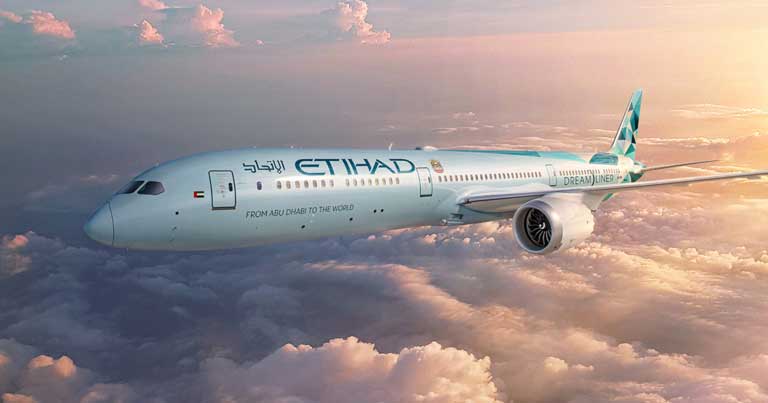The following article was published by Future Travel Experience
The flight is part of the Etihad Greenliner Programme – a two-year partnership between Etihad and Boeing using the airline’s 787 fleet as a test bed for sustainability improvements.

Etihad Airways has operated its most sustainable flight yet, achieving 72% reduction in carbon emissions.
The London Heathrow to Abu Dhabi flight, which took place on 23 October, is part of the Etihad Greenliner Programme – a two-year partnership between Etihad and Boeing using the airline’s 787 fleet as a test bed for sustainability improvements in partnership with organisations across the industry. According to Etihad, the programme has required huge collaboration across the aviation ecosystem to deliver a sustainable in-flight product, coordination with airspace management for optimised flight routing, new technology flight deck tools, sustainable aviation fuel (SAF), contrail reduction and airport handling processes.
In an industry-first, EY20 was the first commercial flight to explore contrail-avoidance. Working with UK-based SATAVIA, the team identified potential areas of ice super-saturated regions in the atmosphere where harmful contrails are likely to form, and the flight route was adjusted to avoid these areas. Based on the original and adjusted flight plan, the strategy avoided the production of approximately 64 tonnes of CO2e, with a fuel penalty of only 100kg, or 0.48 tonnes CO2.
“These are noteworthy savings,” said Mohammad Al Bulooki, Chief Operating Officer, Etihad Aviation Group. “When Etihad committed to achieve net zero, it was acknowledged that it was only possible if the airline worked collaboratively and positively with our industry partners. That is exactly what Etihad has done with the Sustainable Flight. Of equal importance, Etihad, Boeing and its partners – airports, ANSP, and suppliers – used the flight to learn where further improvements could be made.
Talking after the flight, Tony Douglas, Group Chief Executive Officer, Etihad Aviation Group, said: “I want to pay particular tribute to our partners; Boeing, NATS, Eurocontrol, GE Aviation, Vitol, SATAVIA, deSter, Sola The Netherlands, ButterflyCup, Agthia, Jubail Island Mangroves and DNata Catering. This is only possible when we all work together, and we all commit to making whatever savings we can. Each of these partners played their own, significant role in the step we took today.”
The contributions covered three phases – planning, in-flight and post-flight. This included preparing the aircraft, engines and route planning systems to optimise take-off, en-route and landing flight paths and trajectories, minimising contrail formation, working with passengers to reduce their luggage and rewarding those that travelled light.
Moreover, inflight catering was also appropriately sourced and served on sustainable crockery and with light-weight cutlery. The crockery itself is part of a circular recycling process where they are returned to the manufacturer at the end of their serviceable life and ground down to its raw material and remade. Guests were also provided with environmentally friendly plant-based water bottles and limited-edition tote bags from upcycled aircraft materials. Etihad reports that 80% of all single use plastics were eliminated.
Once the aircraft arrived at Abu Dhabi, it was serviced by Etihad’s new fleet of electric vehicles for ground logistics such as baggage unloading. Where electric vehicles were unable to be used, Etihad purchased bio-diesel to fuel equipment such as the airline’s passenger coach service between Abu Dhabi and Dubai, meaning all passengers, including those transiting to Dubai, were completely carbon neutral for the entirety of their journey.
The data gathered from the aircraft’s sensors was added to Etihad’s growing database on flight performance, and analysed using tools from Greenliner partner, GE Digital to improve understanding of flight performance and allow quick recognition of unsustainable activities.
Article originally published here:
Etihad’s ecoflight achieves 72% reduction in carbon emissions
from Future Travel Experience https://ift.tt/3EsUGNm
Comments
Post a Comment